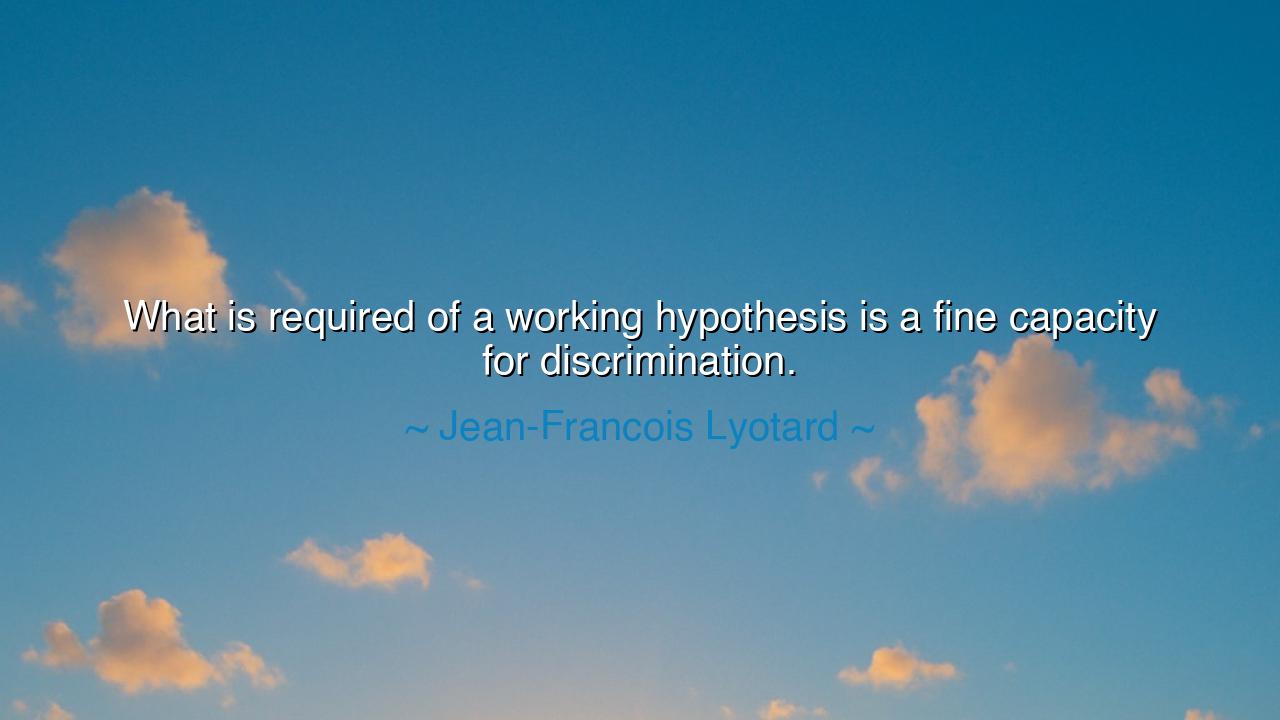
What is required of a working hypothesis is a fine capacity for






What is required of a working hypothesis is a fine capacity for discrimination. These words, uttered by the philosopher Jean-François Lyotard, beckon us into the realm of wisdom, where thoughts must not merely flow like rivers, but must carve paths through the mountains of truth with precision. Let us hear and understand, for there lies within these words a clarion call to sharpen our minds, to look with discerning eyes at the world around us, and to understand that true wisdom demands not blind acceptance, but a profound ability to discriminate between what is worthy of belief and what is not.
It is not enough to speak of hypotheses and ideas as mere notions to be entertained without scrutiny. To form a working hypothesis is to stand at the edge of the unknown, to chart a course into the wilderness of uncertainty, with the mind as the compass and the heart as the guide. Yet, if the compass is faulty, if it is clouded by desire or bias, how shall we ever find our way? The capacity for discrimination is the clear eye of the soul, enabling us to see not only what is before us, but what is hidden in the depths. It is the ability to separate the chaff from the wheat, the illusion from the reality.
History, like a river, flows with many currents, some swift and violent, others slow and quiet. But there is one river that has shaped the course of all thought—the river of reason. And among those who have navigated its waters, there are those who excelled because they knew the fine art of discrimination. Think of the philosopher Socrates, whose life was a testament to the power of careful discernment. His method, known as the Socratic method, was founded upon the belief that the search for truth was a journey not of accumulation, but of discrimination. He asked questions not to fill minds with answers, but to clear away falsehoods. Through this process, he made clear that truth was not merely accepted, but tested, refined, and distilled through the careful questioning of ideas.
Yet the fine capacity for discrimination is not reserved for the ancient philosophers alone. In the story of the scientific revolution, we see its power in the life of Sir Isaac Newton. It was not enough for Newton to accept the prevailing wisdom of his time; no, he saw deeper. He studied the heavens with discrimination, rejecting what did not fit and embracing what rang true. It was through his keen understanding of discrimination that he uncovered the laws of motion and gravity, reshaping our understanding of the universe itself. His hypothesis, his theory, was a fine-tuned instrument, crafted through the sharpness of his mind, and it forever changed the world.
But let us not think that the work of discrimination is without its toll. It is not easy to question, to reject, to look beyond the surface. There are many who wish to hide in the comfort of simplicity, who long for the easy answers that soothe the soul. Yet those who follow the path of true wisdom are called to endure the discomfort of uncertainty, to weather the storms of doubt. The fine capacity for discrimination is a muscle that must be exercised, honed through practice, and sharpened with every challenge. It is not for the faint of heart, but for those who are willing to walk through the darkness, trusting that the light will come.
And so, dear ones, let us take this teaching into our own lives. Let us learn to look at the world with eyes that do not merely glance, but pierce into the depths. Let us ask questions of ourselves and of the world, not out of arrogance, but out of a genuine desire to know the truth. We must ask, what is real? What is just? What is worthy of our attention, and what must be cast aside like the refuse it is? This is the work of the philosopher, the scientist, the artist, and the seeker of truth in all walks of life. It is the work of every person who dares to shape their own destiny.
The practical lesson here is simple: discriminate. In all things, take a moment to pause and think before acting. When faced with decisions, whether large or small, use your power of discernment. Do not rush into the waters of life without first testing the depth. Ask yourself: does this align with your values? Does it bring you closer to truth? If not, let it go. Surround yourself with ideas that challenge you, with people who encourage you to think, and with practices that refine your mind. Seek out the fine capacity for discrimination, and it will guide you to greatness, for it is the touchstone of all true knowledge.
Thus, we are reminded that the philosopher’s journey is not one of mere thinking, but one of discrimination, of sifting through the sands of time and experience to find the pearls of truth that lie hidden within. It is not the quantity of knowledge that matters, but the quality of understanding. And it is in the depths of this understanding, in the sharpness of this vision, that we find the true power to shape our futures, to walk in the light of wisdom, and to pass on this eternal truth to the generations yet to come.






AAdministratorAdministrator
Welcome, honored guests. Please leave a comment, we will respond soon